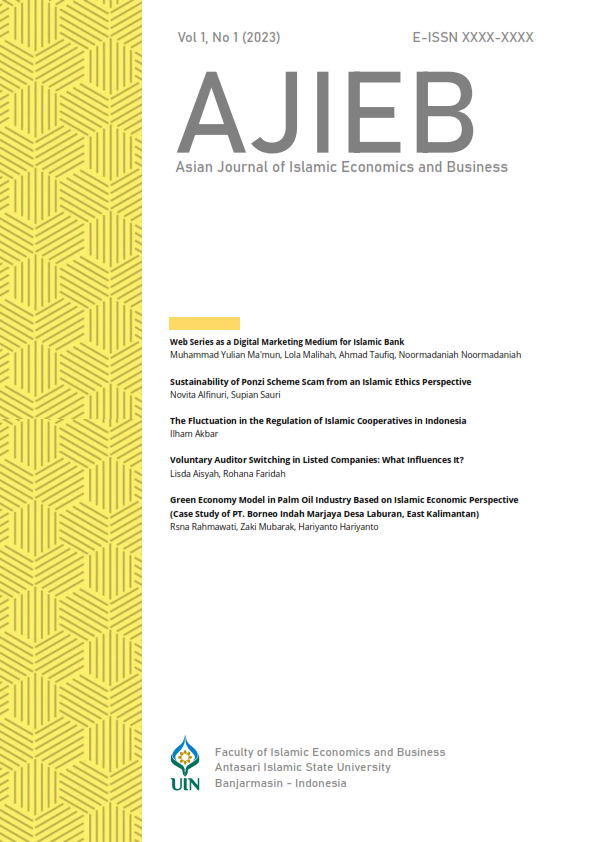Green Economy Model in Palm Oil Industry Based on Islamic Economic Perspective (Case Study of PT. Borneo Indah Marjaya Desa Laburan, East Kalimantan)
DOI:
https://doi.org/10.18592/ajieb.v1i1.10390Keywords:
Green economy model, palm oil industry, PT. Borneo Indah Marjaya, Islamic economics.Abstract
The palm oil industry contributes significantly to household welfare resulting from the palm oil business. The palm oil industry also has great potential that can cause environmental problems. Green economy is believed to be a solution to environmental problems caused by economic activities. This study aims to find out how the Green Economy Model in the Palm Oil Industry Based on the Islamic Economic Perspective of PT. Borneo Indah Marjaya about its application in accordance with the teachings of Islamic economics and has it been carried out properly. The method used is qualitative descriptive with interview, observation and documentation techniques directly at PT. Borneo Indah Marjaya.Based on the results of research that the green economy model is very important to be applied by palm oil industry companies producing CPO oil so that this economic business activity can be run sustainably and environmentally friendly. The implementation of green economy is closely related to the 7 principles of Indonesian Sustainable Palm Oil (ISPO). This research provides an understanding of the concept of green economy that in economic activities it is necessary to think about justice, welfare and income benefits both in society and companies and in accordance with the teachings of Islamic law.References
Abdi, Z., Pazli, & Waluyo, T. J. (2021). Indonesian Palm Oil Industry Post RED2 European Union. Tambusai Journal of Education. University of Riau, 5, No. 3, 9575.
Adnan, M. (2021). Ecological Hegemony: The Transformation of the Wehea Dayak Community; Locus (Tiara Wacana Group).
Elmy, M., Alfinuri, N., Winarsoc, H. P., & Akhyard, Z. (2022). The Role of Compassion as a Shared Value of Grassroots Communities in a Circular Economy. Jurnal Pendidikan Kewarganegaraan, 12(01), 67-73
Fakrurradhi. (2021). Principles of Islamic Economics in the Qur'an According to Tasir Ibn Kathir. Al-Mashaadir Journal 2, No.2
Hafizah, Y., & Nilasari, E. (2020). Gerakan ekonomi islam kontemporer: studi terhadap perkembangan mitra koperasi syariah 212 di kalimantan selatan. At-Taradhi: Jurnal Studi Ekonomi, 11(1), 1-17
Irawan, B., &; Soesilo, N. I. (2021). The Impact of Downstream Policy of the Palm Oil Industry on CPO Demand in the Downstream Industry. Journal of Economics &; Public Policy . University of Indonesia, Vol. 12, No. 1, 15. https://dx.doi.org/10.22212/jekp.v11i1.2023
Iskandar et al, A. (2019). Green Economy Indonesia in the perspective of Maqashid Shari'ah. Al-Mashrafiyah: Journal of Islamic Economics, Finance and Banking, 3(2), 83. https://doi.org/10.24252/al- mashrafiyah.v3i2.9576
Kamariah, S., Safitri, V. M., & Faridah, R. (2024, September). Inventory Planning and Control Management in an Effort to Increase Warehouse Effectiveness. In Antasari Conference on Islamic Economics and Business (ACIEB)
Ministry of National Development Planning / Bappenas. (2022). Bappenas Launches Green Economy Index to Support Indonesia's Economic Transformation
Makmun. (2011). Green Economy: Concept, Implementation, and Role of the Ministry of Finance. JEP Journal of Economics and Development, Vol. 19, No. 2, 6–14. https://doi.org/10.14203/JEP.19.2.2011.1-15
Nurdjannah. (2018). Making Polymeric Materials from Palm Oil (1st ed.). CV. Nas Media Library: Makassar
Prasetyo, A. (2022). Analaisis of the Influence of Oil Palm Plantations on the Economy in 8 Cities of North Sumatra Province in 2000-2020. University of Muhammadiyah Surakarta. 2.
Purboseno, S. (2022). Water Calculation: Water Balance Model Based on Environmental Economics. Epigraph of Prima Communiqué: Sukoharjo
Rahman, A. (2018). Identification of strategies to improve community welfare in Sungaiambawang District, Kuburaya Regency, West Kalimantan Province. Journal of Development Management, Vol. 5, No. 1.
Sabartiyah. (2019). Environmental Conservation. ALPRIN: Semarang
Sinaga. P, Anton. A. (2022). SME Empowerment: For Local Economic Development and Community Welfare in Medan City. CV. Media Science Indonesia
Suprianik, Musari, K., &; Diartho, H. C. (2022). Islam and Green Economics (1st ed.). Jejak Pustaka: Yogyakarta
Suratini, S., El Wafa, F., Ariyanti, R., Hastomo, D. A., & Arif, D. (2024). The impact of digital currencies, trade policies, and climate change mitigation on global economic stability. The Journal of Academic Science, 1(3), 152-158.
Suwarno, W. (2019). EU Palm Oil Policy and Challenges for Indonesia's Economic Diplomacy. Journal of International Relations, 8, No. 1.
Yusuf, M., Azhari, F., Al Amruzi, F., Wahidi, M. M. I., & Anafarhanah, S. (2023). Green Economy
Financing According to Fiqh Al-Biah as Part of Maqashid Sharia. Pena Justisia: Media Komunikasi Dan Kajian Hukum, 21(1), 201-212.
Downloads
Published
How to Cite
Issue
Section
License
Copyright (c) 2023 Rsna Rahmawati

This work is licensed under a Creative Commons Attribution 4.0 International License.
Authors who publish with this journal agree to the following terms:
- Authors retain copyright and grant the journal right of first publication with the work simultaneously licensed under a Creative Commons Attribution License that allows others to share the work with an acknowledgement of the work's authorship and initial publication in this journal.
- Authors are able to enter into separate, additional contractual arrangements for the non-exclusive distribution of the journal's published version of the work (e.g., post it to an institutional repository or publish it in a book), with an acknowledgement of its initial publication in this journal.
- Authors are permitted and encouraged to post their work online (e.g., in institutional repositories or on their website) prior to and during the submission process, as it can lead to productive exchanges, as well as earlier and greater citation of published work.




